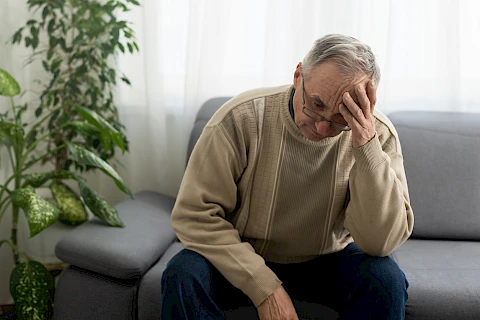
As caregivers, ensuring the overall well-being of our seniors is vital. Among the various aspects of health to consider, mental health often takes a backseat when, in reality, it needs equal attention. It's time to focus particularly on anxiety in seniors, a condition that's more common than we may realize and presents quite differently in older adults compared to younger ones.
Anxiety in Seniors
Anxiety is a normal stress response, but when it becomes chronic, it can interfere with daily activities and overall quality of life. In seniors, anxiety often stems from significant lifestyle changes, health concerns, or the loss of loved ones. The challenge is that anxiety in seniors frequently manifests differently than in younger populations, making it harder to recognize. For instance, seniors may not experience traditional symptoms like excessive worrying. Instead, they may show restlessness, fatigue or even complain about physical problems.
According to the American Association of Geriatric Psychiatry, about 10-20% of seniors experience anxiety symptoms that significantly affect their functioning. This statistic underscores the importance of understanding this issue.
Recognizing the Signs of Anxiety in Seniors
Here are a few signs you should know:
Behavioral
Recognizing anxiety in seniors requires vigilance for subtle changes in behavior. Common signs include restlessness, social withdrawal, irritability, trouble sleeping, and a seeming fixation on routine. A senior who suddenly becomes overly concerned with maintaining a schedule or becomes upset if plans change might be showing signs of anxiety. Similarly, excessive worry about health, finances, or family can also be indicative of anxiety.
Physical
Physical signs shouldn't be ignored either, as anxiety often manifests physically in seniors. They may complain of unexplained aches and pains, display tremors and twitches, or even experience heart palpitations. Keep in mind that these signs don't automatically mean a senior has anxiety, but they are certainly red flags that warrant further attention.
What to Do If You Notice Signs of Anxiety in a Senior
If you notice signs of anxiety in a senior, the most critical step is not to ignore them. Start by having an open and gentle conversation about what you've observed and express your concerns. Please remember that the seniors may not even realize they are experiencing anxiety, or they might feel embarrassed or frightened.
Seek professional help. A healthcare provider or mental health professional can accurately diagnose anxiety and suggest effective treatments. Treatment can include medication, therapy, lifestyle changes, or a combination.
Senior Helpers Southwest Pittsburgh Provides Support for Seniors Struggling With Anxiety
As a caregiver, recognizing and addressing anxiety in seniors is crucial to their mental health and overall well-being. Though it might seem daunting, understanding the signs and what steps to take can make a significant difference.
We urge caregivers in Pittsburgh, Bethel Park, Bridgeville, Allegheny County, and Washington County to stay vigilant for signs of anxiety in their seniors. Reach out to us at Senior Helpers Southwest Pittsburgh if you suspect a loved one might be dealing with anxiety.